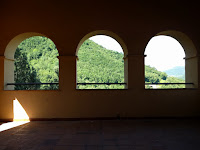Imagine
setting up a therapeutic community for business entrepreneurs, experts by
experience, family and friends, and a few mental health staff. The
entrepreneurs were from a supportive society in Rome. We had a financier, a
travel business executive, a high level head-hunter in telecoms, a previous
national queen of salsa who is now a retail décor retail entrepreneur, and a
barrister – as well as a boy scout leader, a couple of pianists and guitarists
plus a singer with a beautiful
This was our first attempt to try therapeutic community principles out on people from entirely non-clinical backgrounds, by offering them three days of immersion in a carefully planned and designed ‘Enabling Environment’.
It has worked for many years as a useful training course for practitioners in TCs, then more generally for multidisciplinary staff in mental health services, and more recently as a ‘taster’ of what enabling environments feel like ‘from the inside’. This was the first time we have tried out the format on a mixed collection of people from completely ‘normal’ backgrounds.
The setting was spectacular – a converted Franciscan monastery in the hills about 50km out of Rome, with a sheer drop of 100m to the rapids below. I Also think l it was haunted – not only the site of an ancient Roman aqueduct (which we walked through), but it also had eerie dark corners, unexplained walled-off areas and quite a few bumps in the night. And – oddest of all – although the outside temperature was in the mid 20s, we were all shivering when we went into the staff room, and needed far more layers of clothes than you expect in Italy in the summer.
The Italy v
Sweden football match threatened to derail the first small groups, but – with
the importance of structure in mind – plans for a vote on the matter were
abandoned when the four staff walked out of the first community meeting exactly
on time. Everybody turned up for the small groups and the football was never
mentioned again (Italy won 1-0).
The course
went unexpectedly well – by the end, many of the participant expressed genuine
surprise and gratitude for what they had learned, and felt, and experienced
together, and everybody joyfully joined in with the more playful fun and games
we all had together. At least two or three of them said that they had gained
transformational insights over the three days.Perhaps the
most interesting observation – which can only be qualitative and
impressionistic at the moment – is that the entrepreneurs ‘jumped in’ more
willingly than most of the non-TC clinicians, and were considerably helped by
the openness and authenticity of the experts by experience. It is as if normal
mental health training makes staff more ‘defended’ and unable to be in touch
with their own emotions – unless they work in TCs.
That is
quite a hypothesis to test – but Aldo and I are on the case. Aldo has devised
questionnaires to demonstrate that the workshop closely reflects the Royal
College of Psychiatrists ‘Enabling Environments’ quality standards, and we also
hope to show that this sort of experiential workshop trains people in a way
that no other learning experience does …and is ultimately justifiable in terms
of efficiency and cost-effectiveness.
Please feel
free to post any ideas that might help us to do this!



No comments:
Post a Comment